23 times age has been an issue for US presidents and candidates
Darren Samuelsohn,Kimberly Leonard

- Joe Biden is old. He will turn 82 in November 2024, just after voters go to the polls.
- Three of the last seven presidents broke the record for being the oldest.
- Young presidential candidates often try to play up their energy but face questions about experience.
The knock on President Joe Biden has become almost cliché.
He's too old. He mangles simple things such as riding a bike, reading cue cards, and putting on a jacket. It's time for him to pass the torch to a new generation of American leaders.
It's also not the first time a president's age — too old, or too young — has become a dominant theme in US politics.
Both sitting and aspiring presidents (and their running mates) have grappled with voters' concerns, reporters' questions, and rivals' barbs about the number of times they've orbited the sun.
To inoculate themselves against criticism, some have pledged to serve only one term or opened their health records for public examination. They've talked up their résumés and challenged their opponents' maturity.
Sometimes this worked. On occasion, the younger whippersnapper won anyway.
Here's a look at some of the previous White House campaigns where youth and experience went to war, all the way up to the nascent 2024 battle that could pit the two oldest presidents in US history at the time of their inauguration — Joe Biden and Donald Trump — against each another.
'The torch has been passed on'
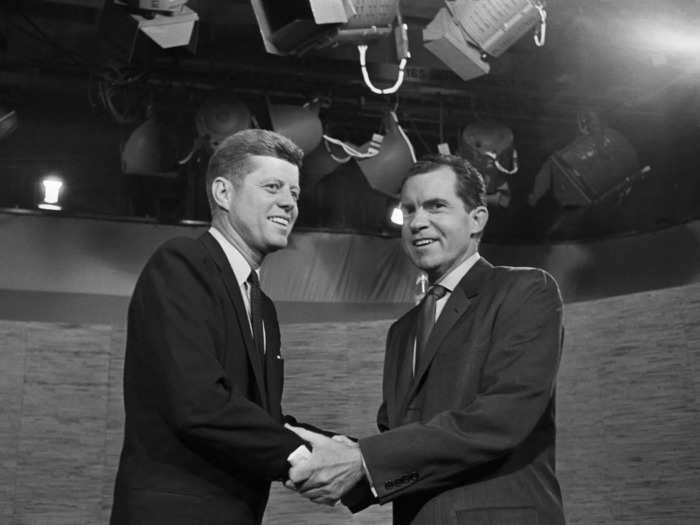
Youth and experience were central features of the 1960 presidential campaign between two men in their 40s, Democratic nominee John F. Kennedy and Republican nominee Richard Nixon.
Both were running to succeed President Dwight D. Eisenhower, who, at 70, was then the oldest man in US history to hold the office.
Though only five years older than Kennedy, Nixon maintained that he had a superior résumé and experience for the job, particularly after serving two terms as Eisenhower's vice president. He also argued that Kennedy was too young and inexperienced to lead the US during the Cold War.
Kennedy won the election, albeit narrowly, by capitalizing on his relative youth — he was 43 years old — and energy to become the second-youngest president after Theodore Roosevelt. He also was the first US president born in the 20th century, a point he drove home in his inauguration address in proclaiming "that the torch has been passed on to a new generation of Americans."
It's a line that would be referenced again and again in future presidential races.
An aging ex-VP nearly drafted to challenge Carter
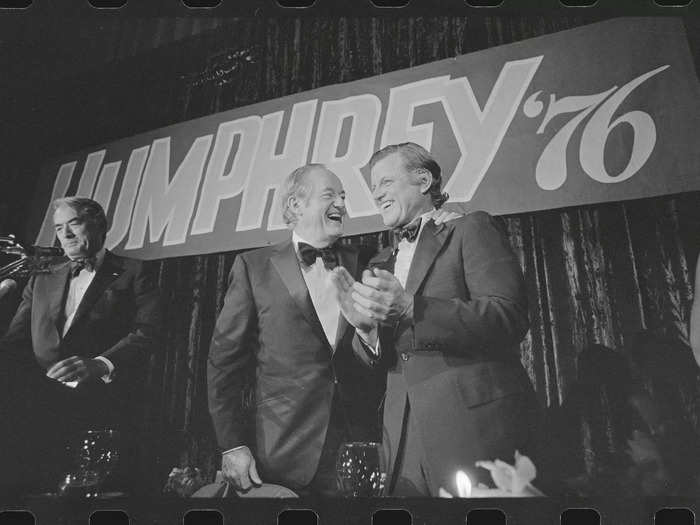
In 1976, Democrats feared their presumptive nominee, Jimmy Carter, was headed for certain defeat against President Gerald Ford — so some started looking for last-minute alternatives.
A prominent name kept resurfacing: Sen. Hubert H. Humphrey of Minnesota, the former vice president under Lyndon B. Johnson. There was just one problem: Humphrey had not taken any formal steps toward running.
"Age and circumstance have thus far forced the senator unhappily into a noncombatant's role," read a Newsweek report from April, 1976, about the then 64-year-old Humphrey. But the story went on to describe how "the scent of blood has lately begun to tempt him out of it."
Carter, a former Georgia governor, went on the attack. He challenged Humphrey over his age and "reputation as a loser," the latter being a reference to two previous failed bids for the White House: as the Democratic nominee against Nixon in 1968 and in the 1972 presidential primaries.
Humphrey responded by arguing he felt fine and was working 18-hour days, according to US News & World Report. He never did get into the race, and two years later, he died at age 66 after having bladder cancer.
'It looks like Reagan. If he doesn't die first.'
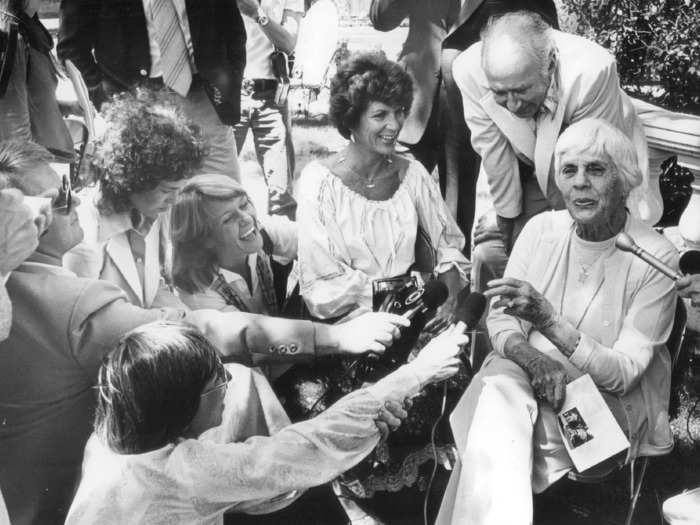
Ronald Reagan entered the 1980 presidential campaign as the Republican front-runner, but he carried a big piece of baggage: his age.
He was 69 at the time of his official announcement. If he were to win the White House, he'd best Eisenhower's record as the oldest US president. His Democratic rivals couldn't resist the temptation to make age an issue as the GOP primary season started.
"It looks like Reagan. If he doesn't die first," President Carter's mother, Lillian Carter, quipped to an Alabama college audience in January 1980, the Associated Press reported at the time.
Bob Dole: 'I'm your man' if you want a younger Reagan
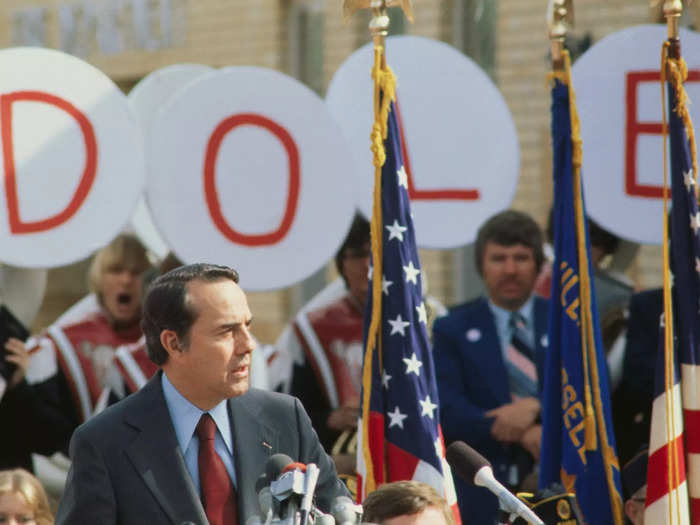
Republican rivals were also willing to take subtle swings at Reagan over his age.
"The rest of us would NEVER on earth make an issue of it," Sen. Bob Dole of Kansas said in January 1980, according to an Associated Press account. "Of course, we are planning a big birthday party for him in February. There'll be a cake with SIXTY-NINE candles."
Dole, who was 56 at the time, added, "If you want a younger Ronald Reagan, with experience, I'm your man."
A version of that line would end up being used against Dole 16 years later, when he did finally win the GOP presidential nomination.
Run, George, run
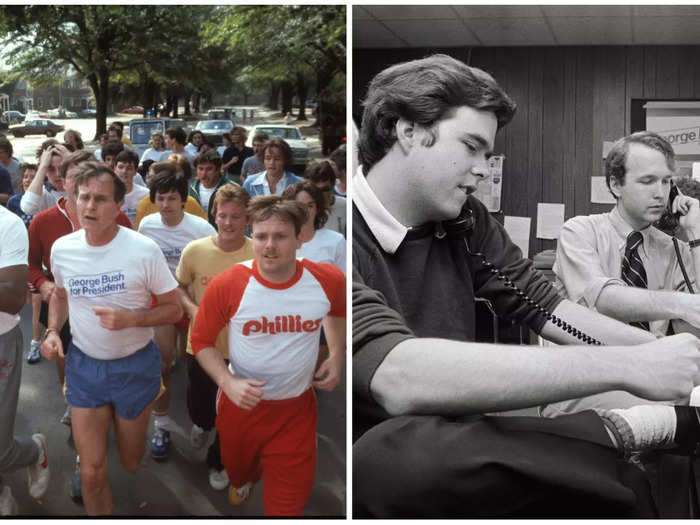
Before he became Reagan's vice-presidential running mate, George H.W. Bush was Reagan's opponent in the 1980 Republican presidential primary. He, too, tried to exploit questions about the 1980 front-runner's senior citizenry.
In early January, Bush brought journalists along to document him jogging and doing other exercise.
"I must be dead," he told reporters after one strenuous workout in Concord. "I knew campaigning in New Hampshire was rough, but this is absurd."
Bush's oldest son, Neil, then 24, also took a swipe at Reagan that March by saying he was "not bad if you like a 69-year-old president." The remark, made at a University of Florida fraternity house just days before the Sunshine State's GOP primary, went national via the Associated Press.
His father later apologized for the comment, referring to Reagan's suggestion that his fellow Republicans follow the "11th commandment": "Thou shalt not speak ill of another Republican."
"The 11th commandment doesn't apply to No. 3 sons," Bush said.
'The 30th anniversary of my 39th birthday'
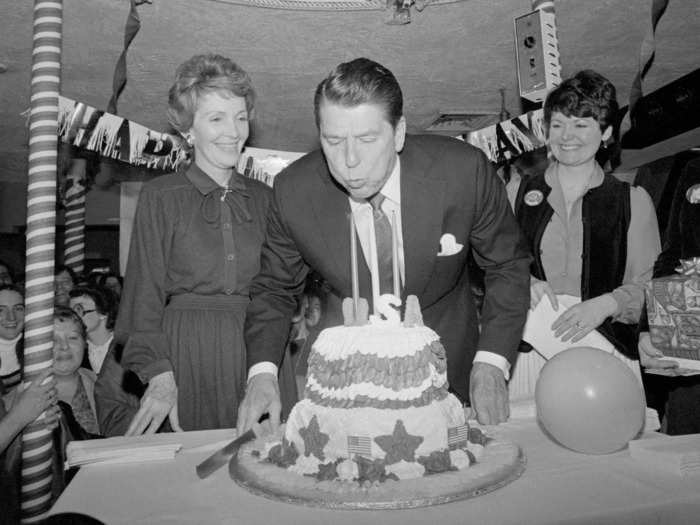
Reagan's best weapon to combat the age question? Humor.
He'd challenge skeptics to arm wrestle, and once on a campaign plane, he pinned his ears forward to show reporters he hadn't had a facelift or any scars.
"I don't think the number of years are very important as long as you retain your faculties, your physical abilities, and so forth. I think I have," he told reporters in a New Hampshire high school in February 1980, the day before his 69th birthday.
"Then," he said, "along with the age goes experience, and hopefully you've acquired some common sense along the way."
On his actual birthday, he joked: "If any of you were wondering why there were only three candles, each one stands for 10, because it's the 30th anniversary of my 39th birthday."
As the presumptive GOP nominee in June 1980, Reagan took on the age questions with a startling announcement as the general election against Carter approached. ''If I were president and had any feeling at all that my capabilities had been reduced before a second term came, I would walk away,'' Reagan told The New York Times. ''By the same token I would step down also.''
Age nonetheless remained a dominant issue during the November campaign, as the country grappled with electing the oldest president in history. But Reagan found ways to turn it into an asset with some voters.
''I don't want to talk about my age, but maybe it's about time someone ran for this office who remembers the Great Depression," he said while campaigning in Michigan about a month before he beat Carter — by a landslide — and won the White House.
Age questions from the start of his term
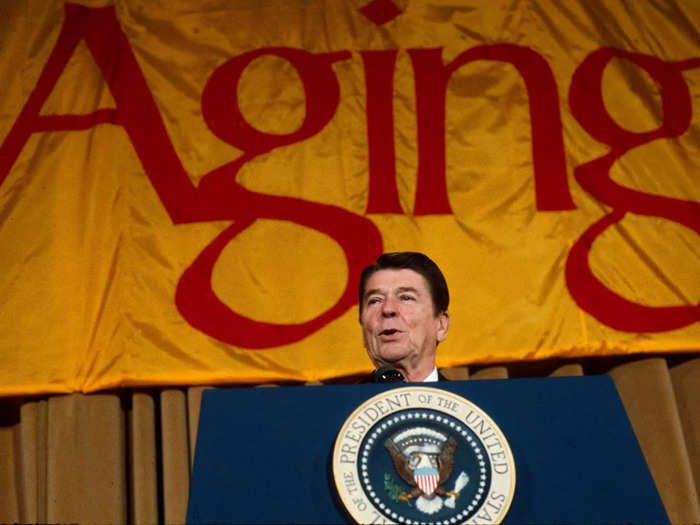
Pressed on his first day as president-elect in November 1980 about his plans for 1984, Reagan replied, "I haven't thought beyond the term to which I've been elected. And if there's any question, I feel just fine."
The jokes continued.
At a black-tie congressional dinner a few days before his 70th birthday in early 1981, the Associated Press reported that the president defined middle age as "when you're faced with two temptations and you choose the one that will get you home at nine o'clock."
Around the same time, according to US News & World Report, Reagan told the Washington Press Club: ''Thomas Jefferson said that one should not worry about one's chronological age. Ever since he told me that ..."
Reagan's age and health became an issue again just a few weeks later as he recovered from an assassination attempt by John Hinckley Jr. at the end of March 1981, in Washington, DC.
Gary Hart enters 'generational struggle' for White House
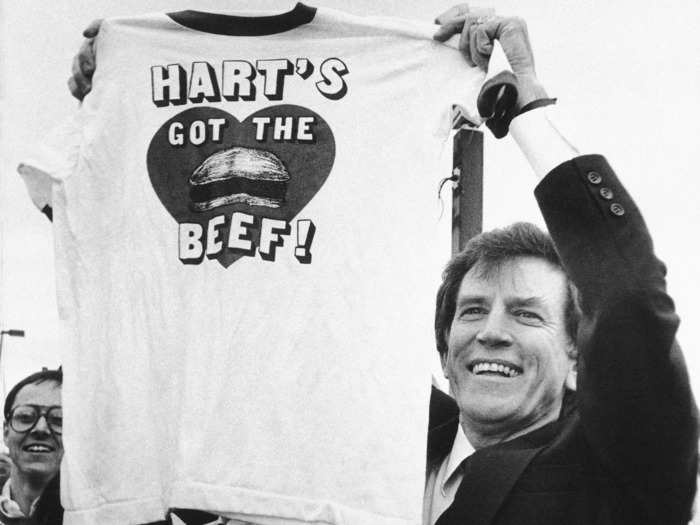
Gary Hart pulled from JFK's playbook in his bid to take on Reagan in 1984.
Running in a crowded Democratic primary field led by former Vice President Walter Mondale — who was born in 1928, right at the beginning of the so-called "silent generation" demographic — the 47-year-old Hart offered a youthful contrast for the Yuppie era.
"This election is a choice between the past and the future, between special interests and new directions, between bosses and a new generation of leadership," one of Hart's TV ads proclaimed.
"A new leader for America," another one said. "Let the future begin here."
Reagan aides worried at the time that Hart was the Democrat who could end up with an advantage if he secured the presidential nomination, The Miami Herald reported. The president also noted in an interview with reporters that he thought Hart was winning over voters because he was "kind of a new face."
"I don't see a need for any generational struggle in here," Reagan said. "If there is, maybe we can settle it with an arm wrestle."
En route to winning 26 states, Hart notched Democratic primary upsets in New Hampshire, Florida, Nebraska, and Oregon, but he ultimately fell short against Mondale in the required number of delegates needed to secure the Democratic presidential nomination.
Hart would begin 1988 as the party's presidential primary front-runner, only to have his candidacy implode over a sex scandal.
A swimsuit pic and a fall
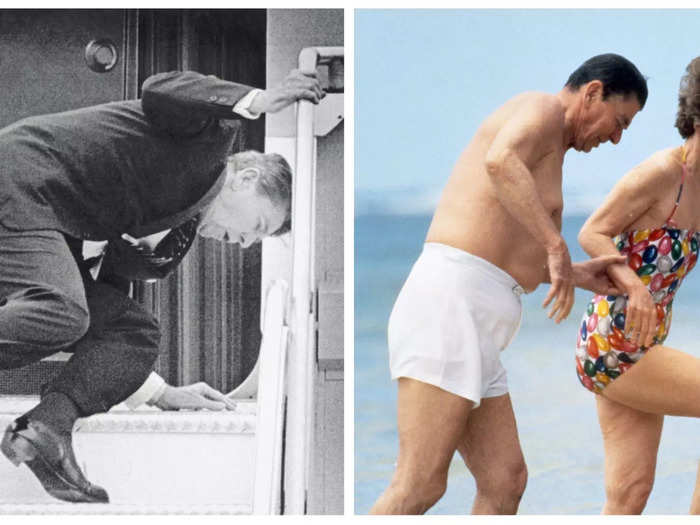
Reagan's age and his health stayed in the headlines as he ran for a second term in 1984.
In May 1984, a photograph emerged of the 73-year-old president and the 60-year-old first lady, Nancy Reagan, wearing bathing suits while on vacation in Hawaii. The Knight-Ridder columnist Nickie McWhirter wrote that not since a photo of a pregnant Princess Diana was published had "such a to-do been made about the flesh of the world renowned."
"Old bodies and young ones both look exactly as they are supposed to look. It's no big deal," McWhirter wrote.
That October, Reagan slipped and fell while walking up a stairway ramp to Air Force One in Seattle. It made for an unflattering image, but the president was fine: He picked himself up and waved to the crowd.
A debate zinger for the ages: 'I am not going to exploit, for political purposes, my opponent's youth and inexperience'
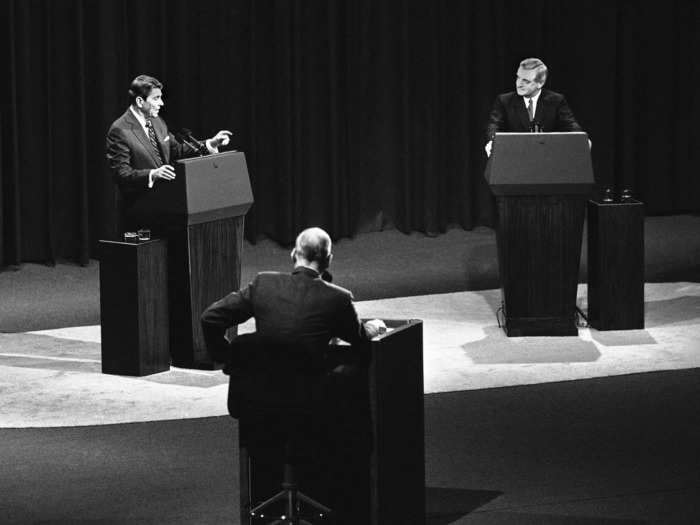
Reagan's age would become a 1984 general-election issue.
In the first debate with Mondale, the president got his facts scrambled and delivered a rambling conclusion statement that left his own advisors fretting about his chances that November.
Reporters wrote about Reagan's hair being grayer and that his hearing aid was visible.
Some Democrats tiptoed around the president's mental acuity.
"You can look tacky and it can backfire by making you look crass," Dottie Lynch, who had served as Hart's chief pollster, told The Miami Herald.
Others went right at it.
"Reagan showed his age," Rep. Tony Coelho of California, the head of the House Democrats' campaign operation, said. "The age issue is in the campaign now and people like me can talk about it, even if Mondale can't."
Then came Kansas City, the site of the second and final presidential debate.
The moderator Henry Trewhitt asked Reagan about staffers who said he'd been tired after his first debate with Mondale. He wanted to know whether that could be a detriment if the president had to deal with a foreign-policy crisis such as the one Kennedy had to handle — with "very little sleep" — when Soviet Union missiles were being deployed in Cuba.
Reagan again relied on humor — to great effect.
"Not at all, Mr. Trewhitt, and I want you to know that also I will not make age an issue of this campaign," Reagan replied. "I am not going to exploit, for political purposes, my opponent's youth and inexperience. If I still have time, I might add, Mr. Trewhitt, I might add that it was Seneca, or it was Cicero, I don't know which, that said, 'If it was not for the elders correcting the mistakes of the young, there would be no state.'"
A few weeks later, Reagan won reelection in one of the most lopsided presidential elections in US history.
'Is America ready for a boy president?'
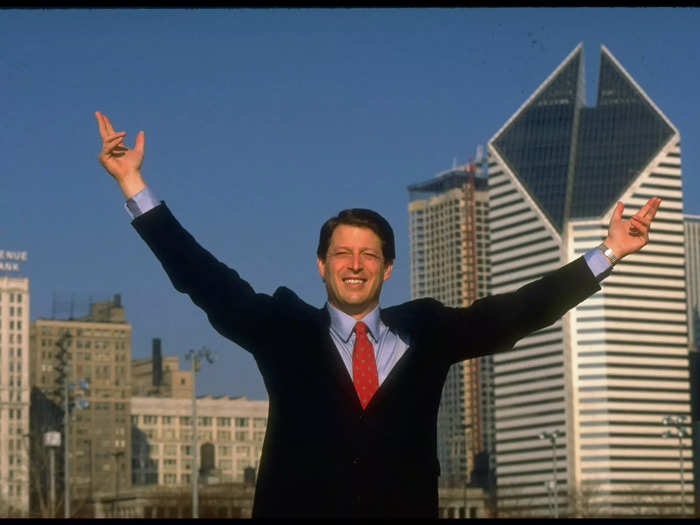
Al Gore's entrance on the presidential campaign stage came in 1988 when the 39-year-old senator tried to emulate Kennedy and succeed the oldest president in US history.
Had Gore won, he would have eclipsed Teddy Roosevelt as the youngest US president.
In a crowded Democratic primary field, Gore made an implicit play for younger baby-boomer voters like him who were attracted to a moderate governing philosophy prioritizing nuclear-arms control, decreasing pollution, reducing the federal budget deficit, and improving healthcare, and education.
"Fifty-eight percent of the voters in November of 1988 will be under the age of 40," Gore said, according to a Los Angeles Times report. "I'm the only member of that postwar generation who is in this race. I think it is time for the torch to pass to our generation and for us to take a leadership position in this country."
A senator from Tennessee, Gore had his backers in Congress.
"Why be surprised at his age? Jesus was 33," Rep. Charles Bennett, a 77-year old Democrat from Florida, told The St. Petersburg Times.
He also had his doubters.
"Is America ready for a boy president?" US News & World Report asked in a headline.
The former governor of Massachusetts, Michael Dukakis, ultimately won the Democratic nomination but lost the White House decisively to George H.W. Bush that November.
But Gore would return four years later under different circumstances.
Another debate zinger for the ages: 'You're no Jack Kennedy'
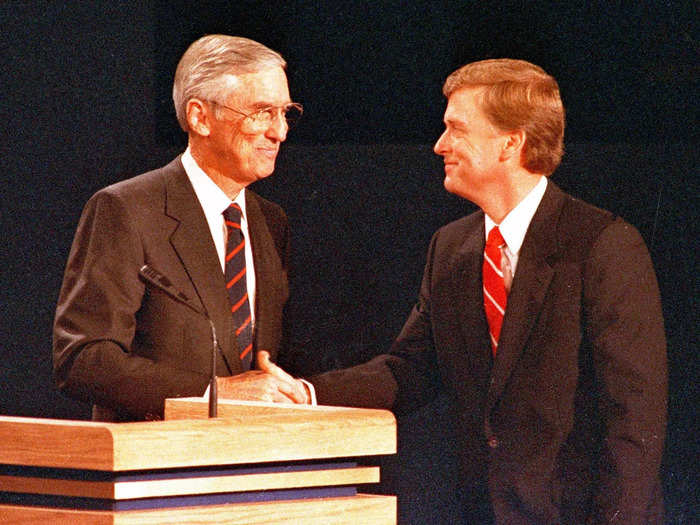
In the 1988 general election, the 67-year-old Democratic vice-presidential nominee, Lloyd Bentsen, had some fun at the expense of his 41-year old Republican rival, Dan Quayle.
Quayle, George H.W. Bush's running mate, had just likened his résumé to Kennedy's in defense of his youth on a national White House ticket.
"It is not just age, it's accomplishments. It's experience," Quayle said, citing his eight years as a senator from Indiana.
Bentsen, a senator from Texas who had previously served in the US House, snapped back: "Senator, I served with Jack Kennedy. I knew Jack Kennedy. Jack Kennedy was a friend of mine. Senator, you're no Jack Kennedy."
The line became an instant classic in the history of presidential and vice-presidential debates.
But it hardly wounded the Bush-Quayle ticket. In January 1989, Quayle was sworn in as the third-youngest vice president in US history, behind Nixon (40, in 1953) and John C. Breckinridge (36, in 1857).
Clinton talks generational 'change'
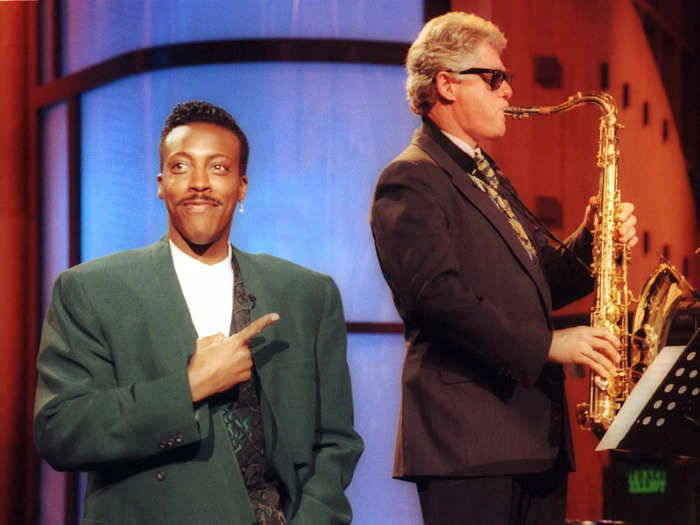
Generational politics returned in 1992 with Arkansas Gov. Bill Clinton, who, at 45, declared his candidacy to become the country's first baby-boomer president. His announcement speech in Little Rock echoed Kennedy.
"I refuse to be part of a generation of Americans that celebrates the death of communism abroad with the loss of the American dream at home," Clinton said in decidedly forward-looking remarks.
"I refuse to stand by and let our children become part of the first generation of Americans to do worse than their parents. The change I seek and the change we must make is not liberal or conservative. It is different, and it is both."
The first all-boomer ticket
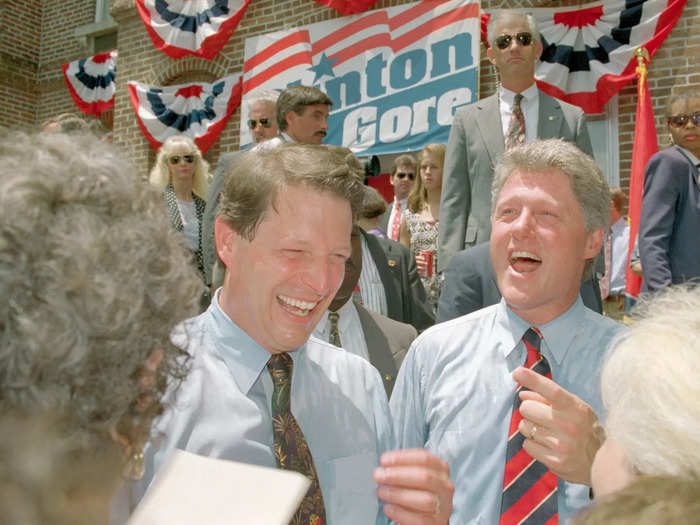
Clinton tapped Gore for VP in 1992, making them the youngest running mates from a major party in US history.
"I think it's an asset," then House Speaker Tom Foley told reporters that summer, noting that they were the first presidential running mates both born after World War II. "And I think that may be a powerful symbolism that the country is moving to a new generation of leadership — mature and responsible and seasoned, but a new generation."
Others weren't so sure, noting they shared both ideology and geography as Southern Democrats.
"I have deep concerns about the ticket," the Rev. Jesse Jackson told The New York Times' Gwen Ifill. "It takes two wings to fly and here you have two of the same wing."
Clinton and Gore celebrated their White House victory that November with a Fleetwood Mac hit with the chorus: "Don't stop thinking about tomorrow."
Dole returns in '96 to face age questions
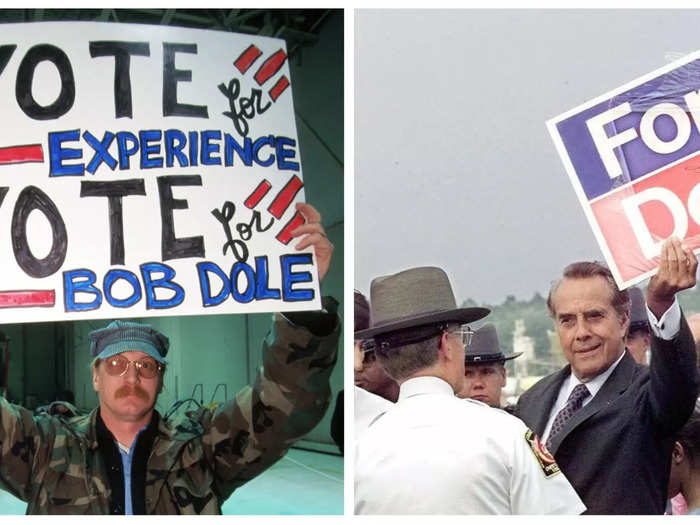
Dole was back on the presidential campaign trail for the 1996 White House race. But this time, he was the one facing questions about his age.
If Dole could beat Clinton, the Kansas Republican would, upon his inauguration, be 73, the same age as Reagan when he was midway through his two terms.
"I think there's a lot of juice left in our generation," Dole, a World War II veteran who was serving as the Senate Majority Leader, said as he launched his presidential bid, according to a Baltimore Sun account.
He had an opening, too. Clinton's first term generated significant criticism due to partisan bickering and rookie mistakes that prompted editorials with headlines like this one, published in The Palm Beach Post in January 1995: "Where have all the grown-ups gone?"
Like Reagan, Dole flirted with a pledge to serve just one term if he won.
"It's something we've talked about," he told PBS's David Frost. "Some have suggested that because if anybody has any doubts about the age. But my view is, just follow me around for a few days and that will be gone."
And just as Dole had poked at Reagan for his age, Dole endured some subtle jabs about his age from his own party.
"I have the greatest respect for every generation, particularly the World War II generation," Lamar Alexander, then 54 and running for president after serving as George H.W. Bush's Education secretary, told reporters in Waterloo, Iowa, in March 1995. "But I think it is time to move on, and my assessment is that most Republican voters by the time we get down to the caucuses and primaries will feel the same way."
The conservative columnist William Safire added: "To Bob Dole: Drop the defensive deal-making about your age; promise to serve two full terms without one afternoon nap."
Obama: The next 'change' candidate
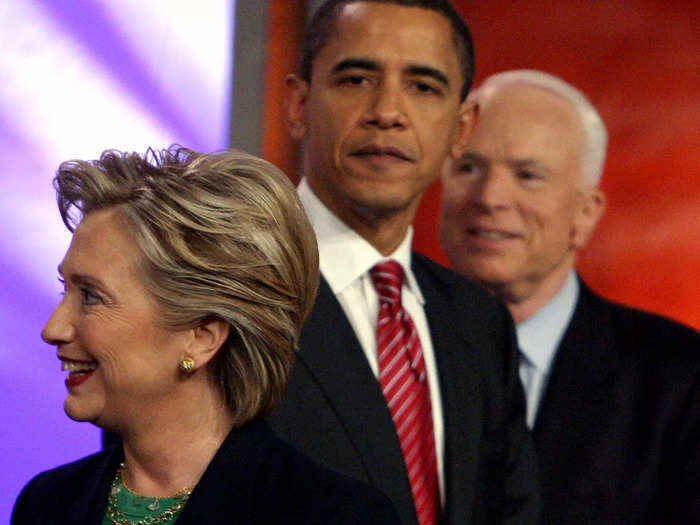
Baby boomers dominated the White House in the early 2000s, with Gore and George W. Bush battling into overtime in the 2000 election, and Bush winning against Sen. John Kerry in 2004.
Then came 2008.
The GOP stayed true to its next-man-up style by nominating Sen. John McCain of Arizona, a Vietnam veteran who had fallen short in a Republican primary against Bush in 2000.
Eight years later, McCain was vying to become the first president from the silent generation. If he won, he'd be 73 on his Inauguration Day, and the second-oldest president after Reagan.
Democrats veered into their own epic intragenerational battle, pitting two senators from very different segments of the baby-boomer era.
Hillary Clinton, the 59-year-old former first lady who was serving as the junior senator from New York, had the inside track.
Her biggest threat became Barack Obama, a 45-year-old from Illinois who'd only been in the Senate for two years. In his own presidential campaign announcement, he tried to capture that same Kennedy spirit.
"Today, we are called once more — and it is time for our generation to answer that call," he said in a speech in February 2007.
The Obama-Clinton race got ugly and personal over their age differences.
Clinton aired a controversial TV ad at the peak of the primary season suggesting Obama wasn't experienced enough to handle a national-security crisis that lights up his phone at 3 a.m.
In a dig at Bill Clinton, Obama said in a January 2008 campaign speech in Denver: "I know it is tempting — after another presidency by a man named George Bush — to simply turn back the clock, and to build a bridge back to the 20th century."
Obama outlasted Clinton in the primaries and would defeat McCain handily in the 2008 general election to become the first Black president of the United States.
At 47, he was also the country's fifth-youngest chief executive.
The hockey-mom VP candidate
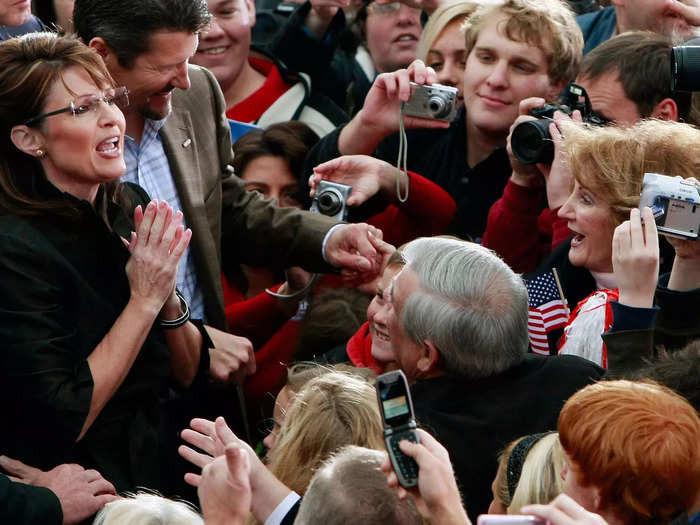
McCain played up his maverick credentials when he picked Alaska Gov. Sarah Palin as his vice-presidential running mate.
At 44, Palin was younger than Obama. She also had less experience, but Republicans saw both traits as an asset — and they worked overtime to play up her image as a "hockey mom" and almost Gen Xer.
For their part, Democrats found it easy to make fun of the choice, given Palin had no national political experience and would be serving behind the septuagenarian McCain, who had a daughter almost as old as Palin.
"On his 72nd birthday, is this really the one-heartbeat-away he wants to put in the White House?" Rahm Emanuel, the Illinois Democratic congressman who'd go on to be Obama's first chief of staff, said, per the Associated Press.
The first Gen X VP nominee
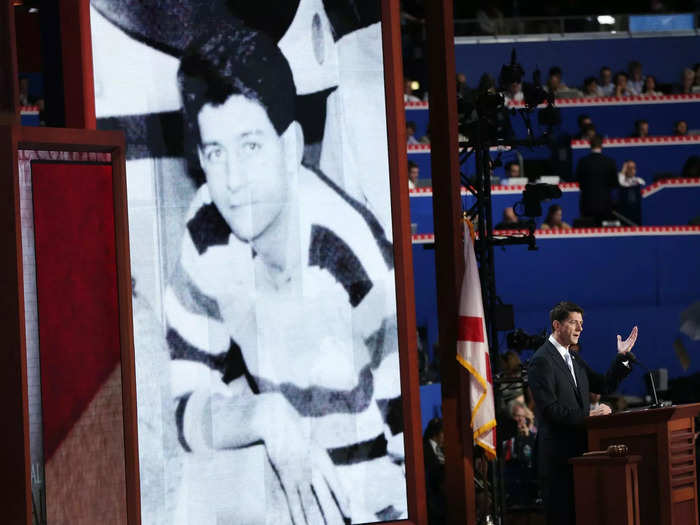
The Republican vice-presidential nominee Paul Ryan became the first person born in the 1970s to get a spot on a major-party White House ticket, alongside Mitt Romney, in 2012.
At 42, the conservative budget wonk liked to talk up his love for P90X workouts and Rage Against the Machine. He was a sharp contrast on the debate stage with then Vice President Joe Biden, who was first sworn into the US Senate in January 1973, when Ryan was a toddler.
Obama and Biden easily beat Romney and Ryan to secure a second term, while Ryan would return to the House and make history three years later as its first Generation X Speaker.
Trump wins at age 70 with grade-school insults
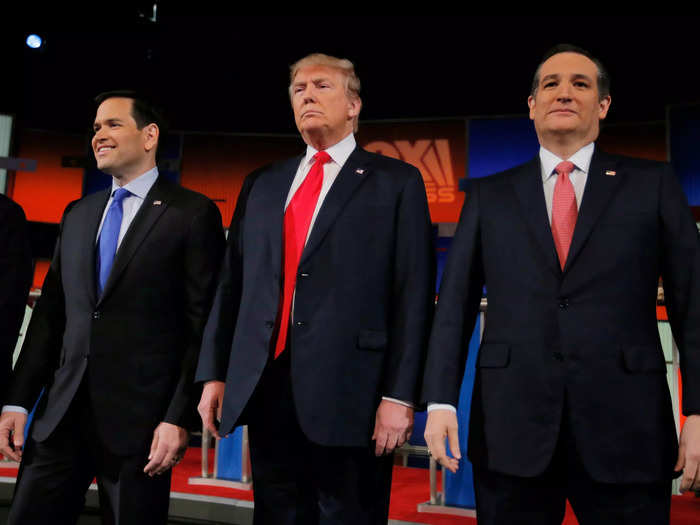
The real-estate mogul Donald Trump, at 70, entered the 2016 Republican primary race with the least government experience of anyone on the debate stage. To contrast himself with his opponents, he gave them childish nicknames.
Trump called Sen. Marco Rubio "little Marco" and dubbed former Florida Gov. Jeb Bush — despite his exclamation-point slogan — "Low-Energy Jeb." Sen. Ted Cruz became "Lyin' Ted," and Trump questioned the Texan's judgment after the senator questioned his.
"I don't think he is qualified to be president," Trump said of Cruz on "Fox News Sunday" in 2015. "I don't think he has the right temperament. I don't think he's got the right judgment. When you look at the way he has dealt with the Senate, where he goes in there like, you know, frankly, like a little bit of a maniac — you are never going to get things done that way."
Trump's victory in the primary was so unexpected that the media didn't really start to scrutinize his age until it was clear he'd be the one to face off against fellow baby boomer Hillary Clinton. Both faced questions about their age, with one story from US News & World Report prognosticating about what could happen if one of them died before the election.
Trump: The oldest president in US history
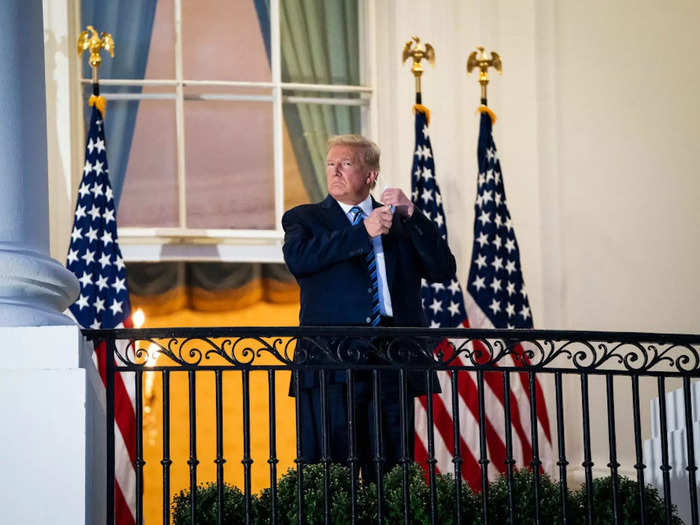
Trump's surprise upset in November 2016 meant he would be the oldest American sworn in as president.
His age, 70 at the inauguration, became a regular source of gossip and speculation during his term, and critics scoffed when the White House doctor praised the president's health despite indications that he was overweight.
Trump slurred words during a speech about relocating the US embassy in Israel to Jerusalem. In June 2020, a camera caught him slowly descending a ramp after a commencement speech at West Point.
During Trump's presidency, aides said they frequently marveled at his stamina, and officials and senators would report that they'd receive calls from him in the middle of the night.
Experience trumps youth
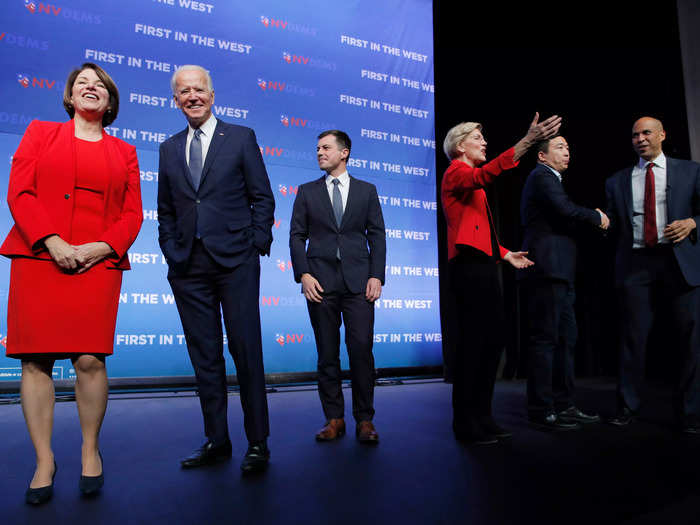
The 2020 Democratic primary to challenge Trump for the presidency featured a record number of contestants from across the generational spectrum.
Like Trump, many of them were in their 70s, including Biden, Sen. Elizabeth Warren of Massachusetts, and Sen. Bernie Sanders of Vermont.
At the other extreme came Pete Buttigieg, the mayor of South Bend, Indiana, and a millennial who was just 37 when he kicked off his exploratory committee. Buttigieg would sometimes chide opponents with exasperated, age-tinged sound bites such as: "We've been arguing about this for as long as I've been alive."
Biden faced questions about his health and age as he campaigned, and even on one occasion used a Reaganesque joke in response. "What the hell concern, man? You wanna wrestle?" he told a reporter inquiring over whether he'd release his medical records.
During one of the Democratic debates, Julian Castro, a Generation Xer at 44, asked Biden a question that was widely interpreted to be about his mental acuity.
"Are you forgetting what you said two minutes ago?" Castro, a former Obama-era Housing secretary, asked Biden.
That prompted others to criticize Biden's age.
"There's a lot of people concerned about Joe Biden's ability to carry the ball all the way across the end line without fumbling," Sen. Cory Booker of New Jersey, then 50, told CNN. He added that Castro "has every right to call that out. I do think tone and tenor is really important."
But the comment backfired and created empathy for Biden, who was born during World War II — and would go on to secure the 2020 nomination.
It turned out that Democratic voters wanted an experienced hand at the top of the ticket, likely a response to Trump's erratic decision-making.
Sanders was the runner-up, even though he was 78 and had a heart attack during the campaign. Young people were among his biggest fans, swept up by the transformational vision he shared.
Two old men
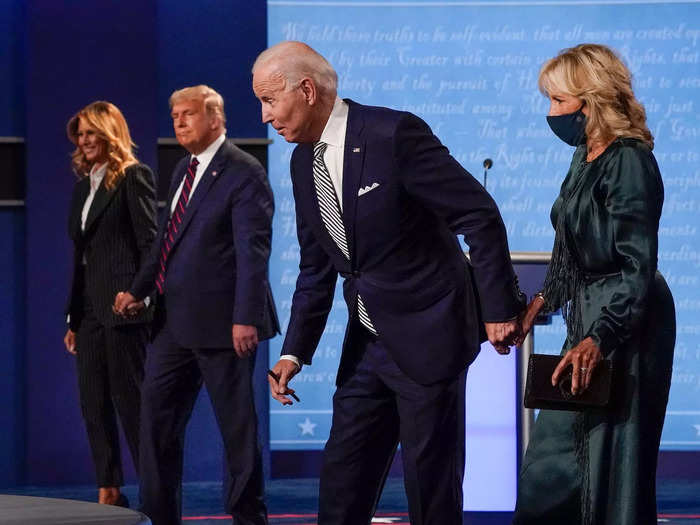
The 2020 election was a face-off between two men who were the oldest presidential nominees in US history.
Trump frequently derided his opponent's age and stamina, nicknaming him "Sleepy Joe." He also tweeted a Photoshopped image of Biden in a retirement home with the words "Biden for Resident" underneath.
"I am a young, vibrant man," Trump told reporters. "I look at Joe, and I don't know about him."
Biden jabbed back in an appearance on "The View."
"If he looks young and vibrant compared to me, I should probably go home," he said.
During the election, Trump contracted COVID-19, which carries a higher risk of serious illness and death for older people, particularly among the unvaccinated. Trump got sick before the vaccine was ready, and he had to be hospitalized.
Biden, for his part, was so careful to protect himself from COVID that he ran a virtual campaign from his basement at his home in Delaware. It underscored the risk to his life if he were to become infected in the months before vaccines became available.
Biden is four years older than Trump, but in the end, voters were willing to overlook Biden's age to get Trump out of the White House.
Gravity wins
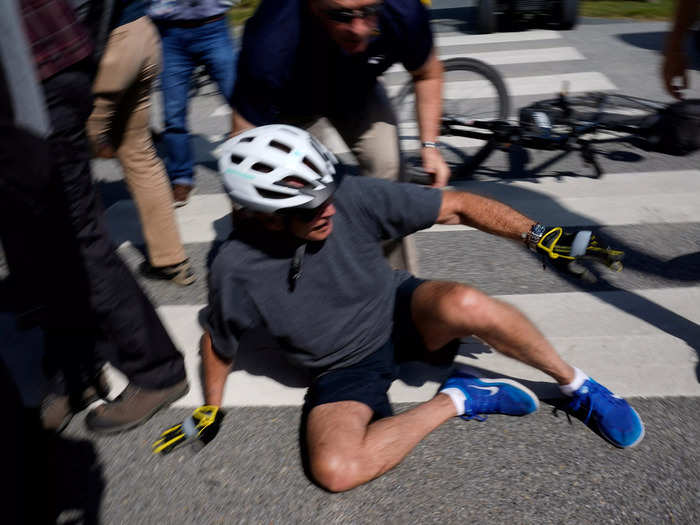
Biden entered the White House in 2021 at the age of 78, making him the oldest person to hold the office.
He also became the first president from the silent generation — even though members of that generation had technically been eligible to serve as president for nearly six decades.
Headlines about Biden's age have proliferated throughout his term.
On June 18, Biden tumbled from his bike after stopping to greet supporters in Delaware. He struggled to put his jacket on in early August. He sometimes misspeaks or trails off in the middle of a sentence and occasionally shuffles when he walks.
Biden's allies have noted that he had to overcome a stutter when he was young, which could contribute to his verbal tics. A November 2021 medical report from his White House doctor said the president had a "stiffer and less fluid" way of walking than a year earlier.
His doctor had a team of specialists evaluate Biden, and they reported that "wear and tear" on his spine was the cause.
Well-circulated reels on social media about Biden's health are not just the subject of right-wing media. Some Democrats have gone so far as to say that Biden shouldn't run for president again. He would be 86 at the end of a second term.
Voters appear concerned, as well. A New York Times-Siena College poll found that 64% of Democrats don't want Biden to run for the White House, and age was the top concern.
But the main factor driving Biden to take a go at a second term is the very real possibility that Trump will run again.
When asked about it in July, Biden singled out the portion of The New York Times poll that said 92% of Democrats would vote for him again if Trump was his opponent in 2024.
"They want me to run," Biden said during the 2022 White House Congressional Picnic. "Read the poll. Read the polls, Jack. You guys are all the same. That poll showed that 92% of Democrats, if I ran, would vote for me."
Popular Right Now
Popular Keywords
Advertisement